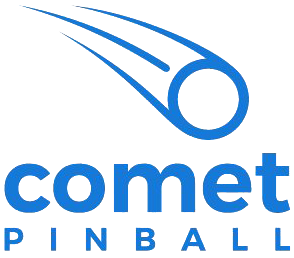Tournament Rules

2025 Edition – The majority of the detailed rules are adapted from PAPA/IFPA whom we thank for making them available for other tournaments.
Rules documentation is subject to change until this line is removed.
Changes for 2025 (TL;DR)
- The All-In Package has been retired. While this package was well received, we heard the feedback regarding limited CTMP tickets available after All-In sales were complete. In place of it, we have created…
- The INDISC VIP package ($350) will come with a 4-Day Event Pass, Classics Target Match Play Entry, a 2025 Limited Edition T-Shirt designed by Johnny Crap, 2 The Open Entries, 2 Classics or Women’s Entries, and some additional goodies. CTMP entries are only available in this package.
- High Stakes has been changed to an initial $500 entry for FIVE Cards. 4 games will be played on each card, a change from 2024’s 5 games, on a bank of 6 games. Players that have bought into High Stakes can purchase additional cards for $100. Playoffs will be the top 4 qualifiers only and as such, this tournament will not earn IFPA ranking points.
- During The Open playoffs, there will be a 1 hour break between Quarterfinals and Semifinals.
- PinClash, sponsored by On Tilt Pinball, is coming to INDISC! This is a heads-up tournament with playoffs between 4 competitors during The Open playoffs 1 hour break. Qualifications will take place throughout the entire event on two dedicated Jaws machines.
I. Quick Overview
With the exception of the Classics Target Match Play Championship, the It Never Drains in Southern California (INDISC) tournaments consist of open card-based qualifying and match play final rounds. During open qualifying, each player may purchase as many cards as they like to attempt to qualify for the final rounds. A point system is used to rank each player’s score on each machine. Those who possess the highest ranking cards at the end of qualifying will participate in the match play final rounds.
In the final rounds, qualifying players play against each other in multiplayer games. A [different] point system is used to determine who advances to the next round and, ultimately, who wins the division.
The Classics Target Match Play Championship is a separate event limited to 120 players. Players will be placed into four-player groups (occasionally three-player) to compete on an individual, randomly selected machine. Points will be awarded based upon performance on that machine (3/2/1/0) (3/1.5/0 for 3 player groups) and added to a running total for the tournament. Once a player reaches the target score of 25 they are considered qualified and no longer play in subsequent qualification rounds. Rounds will continue until 24 players have reached the target score. If the time allotted for match play expires prior to filling all finals positions, the remaining positions will be filled based upon rankings tabulated at the conclusion of the final match play round.
II. Divisions
The Open will be held on a bank of 18-22 tournament games. The Open division cards are $20 each with 5 games recorded on each card. Those players who finish in positions 1-40 will qualify for the “A” division finals. Players eligible for the “B” division who finished in positions 41-56 will qualify for the “B” division finals. Should The Open reach more than 400 active players, finals will be expanded as determined by the tournament directors along with an adjustment to the prize pool.
The Classics Championship will be held on older Electromechanical and/or Solid State games. Classic Championship division cards are $15 each with 5 games recorded on each card. Those players who finish in positions 1-32 will qualify for Classics Championship finals. Should more than 320 players compete in the Classics Championship, a single game tiebreaker round will take place just prior to playoffs to determine the last position(s). For example, if 344 players competed a tiebreaker would be held for players in positions 32, 33, and 34 for the 32nd position. This is to remain compliant with the IFPA 10%-to-playoffs rule.
The Women’s Championship will be held on a bank of 6-7 tournament games. Women’s division cards are $15 each with 5 games recorded on each card. Those who finish in positions 1-16 will qualify for the Women’s finals.
The High Stakes tournament will be held on a bank of 6 tournament games. High Stakes division entry is $500 per participant. Each participant will receive 5 cards, with 4 games recorded on each card. Additional cards may be purchased for $100 each. Those who finish in positions 1-4 will qualify for the High Stakes finals. No IFPA ranking points will be awarded.
Sunday Strikes is a progressive strikes knockout tournament that will be held on the Classics and Women’s tournament games. Registration for the event will take place on Sunday. This is a casual, non-sanctioned tournament. No IFPA ranking points will be awarded.
Any player ranked in the top 250 of the World Pinball Player Rankings at the time the tournament begins shall not be eligible to play in any “B” playoffs. If a player is in such a position, the next lower eligible player shall qualify instead. The previous year “B” division INDISC champions must enter the “A” Division at the following year’s tournament. At the discretion of the tournament officials, any other player whose past tournament performance indicates that they should be treated as an “A” player may be ineligible for the “B” division. [They probably know who they are.]
III. Fees and Prizes
Ticket and Entry Fees
Event sales will open on Saturday, October 5 at 9am Pacific.
Prizes and Payouts
Prizes, as % of total entries are shown in the tables below. Actual values will be determined on-site after all tournament expenses have been deducted from the prize pool and are subject to rounding to the next higher or lower $5 increment.
Prize distribution will begin within 14-28 days after the event and will be distributed electronically via PayPal, EBT, or Wire Transfer. All players with winnings of $600 or more will be required to complete a W-9 or W8-BEN form prior to prize disbursement. Any fees incurred for receiving of funds are the responsibility of the receiving party. Any unclaimed prizes within 60 days of the event for amounts less than $600, or 90 days for amounts $600 or greater, will be considered a donation to INDISC unless prior arrangements have been made to claim the prize.
| The Open | A | B |
| 1st | Stern Pinball Machine + $500 | 6% |
| 2nd | 14% | 3.5% |
| 3rd | 9.5% | 2% |
| 4th | 7% | 1% |
| 5-8th | 3.25% | 0.5% |
| 9-16th | 2% | 0.25% |
| 17-28th | 1.25% | n/a |
| 29-40th | .75% | n/a |
| Classics Championship | |
| 1st | 18% |
| 2nd | 13% |
| 3rd | 10% |
| 4th | 7% |
| 5-8th | 5% |
| 9-16th | 2% |
| 17-32th | 1% |
| Women’s Championship | |
| 1st | 24% |
| 2nd | 17% |
| 3rd | 13% |
| 4th | 10% |
| 5-8th | 5% |
| 9-16th | 2% |
| High Stakes | |
| 1st | 40% |
| 2nd | 25% |
| 3rd | 12.5% |
| 4th | 8.5% |
| 5th | 5% |
| 6th | 4% |
| 7th | 3% |
| 8th | 2% |
| Classics Target Match Play Championship | |
| 1st | 22% |
| 2nd | 16% |
| 3rd | 11% |
| 4th | 7% |
| 5-8th | 4% |
| 9-16th | 2% |
| 17-24th | 1.5% |
| Sunday Strikes | |
| 1st | 24% |
| 2nd | 17% |
| 3rd | 13% |
| 4th | 10% |
| 5-8th | 5% |
| 9-16th | 2% |
Seniors will award a cash prize and plaques for the highest eligible qualifier in The Open.
Youth will award prizes and plaques for the top finishers.
IV. Qualifying Rounds
Purchasing entries
Before purchasing any cards, players must register at the tournament desk. Cards will not be sold for any division beyond the posted time and are non-refundable unless by special permission.
Playing an entry
Players will be added to a digital queue for a machine prior to play by either a scorekeeper or by themselves via the tournament website. Each player can only join one queue at a time regardless of machine division. If the machine is open with no queue, they must still be added to the queue by a scorekeeper prior to beginning play to verify available entries. If there is a queue the scorekeeper will call the player when it is their turn if the player is not already present. If the player does not appear promptly, the next person in line may go ahead of them as called out by the scorekeeper. Once a player has completed their game, the player may either choose to have the score counted or to void the entry. If they choose to count the score, the scorekeeper will record the score, which the player should verify. The scorekeeper will then ask the player if they wish to be added to a new game queue if unused entries are available.
Scoring
At the end of each game, players should wait for a scorekeeper to record their score before leaving the machine. It is the player’s responsibility to ensure that the scorekeeper records the score and to double check the recorded score for correctness. Any player abandoning their machine will be given a recorded score of zero for that play.
Cards are a collection of scores containing a total of 4 or 5 scores from unique machines. At any point during play or immediately after play has been completed, the player may elect to abandon their card by notifying the scorekeeper that they wish to void. This will void all of the scores recorded on the card, and the card will not be entered into the scoring system. No money will be refunded, but the player has no further obligation to complete the previously in-progress card and is free to purchase additional cards if they wish. Only one card in each division may be opened at any time.
Each player’s best score on a machine will receive a point value based on its rank compared to all other recorded scores. The #1 score earns 200 points, #2 score earns 195 points, #3 score earns 190 points and #4 and beyond earn one less point per position, i.e. 189 points down through 1 point. A player’s overall score for a card is the sum of their four or five ranked machine scores, depending on the division.
Division banks will contain multiple games to choose from. The Open, High Stakes, Classics Championship, and Women’s Championship cards will consist of 5 machines.
Because the rankings will change as new scores are posted on each machine, the overall score of each player may change as the qualifying rounds progress.
In the event of two or more scores on a machine being exactly tied, the highest point value of the tied positions will be awarded for each such score.
Tournament officials will endeavor to provide up-to-date scores and rankings. The overall ranking scores are used to determine which players qualify for the playoff rounds.
V. Final Rounds
Advancing to final rounds
When qualifying rounds have been completed, a final calculation of entry scores will be made. Those scores will be ranked, and the top unique players in each division will advance to the final rounds.
The determination of final qualifying standings will be made by tournament officials at the end of qualifying hours, and shall not be changed for any reason, including player error or tournament error.
In the event that two or more players are tied on the qualifying bubble, such that not all of the tied players can advance to the final rounds, a tie-breaking procedure will be utilized. A single game will be played on a machine randomly selected from the qualifying bank of the division. The tied players will play, in randomly determined order, in a multiplayer game on the selected machine, and will subsequently be ranked in the order of their scores on that game. If more players are tied than the selected machine will support in a single game, multiple games will be played to accommodate all tied players, in randomly determined order, and the resulting scores will be compared as if they had occurred in a single game on the same machine.
The same procedure outlined above will be used to break ties on the “bye” line.
In the event that two or more players are tied but are not on the qualifying bubble, a simpler tie-breaking procedure will be used in order to save time. Each player’s best game rank will be examined. The player with the highest game rank will be given the highest seeding, proceeding through all tied players, in descending order of game rank.
For The Open IFPA World Championship, the highest qualifier in Division A has the option of replacing one pinball machine from The Open qualifying bank with another pinball machine from the Women’s or Classics banks for the playoff rounds. If the highest qualifier elects to do so, they are required to select their replacement machine during one of their playoff rounds (see below).
Machine and Position Selection
The machines used for final rounds in each division will be the same as those used in qualifying with the exception of:
- Classics Target Match Play where a subset of machines used in qualifying will be selected for finals.
- The Open where the top qualifier has the option to remove one machine from the qualifying bank and add an eligible machine from the Women’s, Classics, or Classics Target Match Play bank. The replaced machine must be of the same era as the removed machine.
In all divisions, machines can only be selected ONCE per player for the duration of the finals until all available selections have been exhausted. If the top qualifier has chosen to remove and add a machine from The Open bank, the top qualifier will be required to select their chosen machine as one of their selections as long as they remain in the tournament. If the top qualifier has not selected their chosen machine by the final round of 4 they will be forced to select the machine in the first match of the round.
The group that contains the highest-seeded player gets first choice of machine and order of play. The highest-seeded player within each group may choose either the machine to be played, or the order of play. If the highest-seeded player chooses order of play, the remaining players may choose their order, in descending order of seeding, and choice of machine then goes to the next highest-seeded player in the group. Conversely, if the highest-seeded player chooses the machine to be played, then the next highest-seeded player chooses the order of play, with the remaining players choosing order of play in decreasing order of seeding.
Game and position selections for all matches will be made at the beginning of the round. For example:
Group #1 contains Alan, Bill, Chester, and Darrel in seed order. Alan selects Space Madness for match #1. Bill chooses to go 4th, Chester chooses to go 3rd, and Darrel chooses to go 2nd leaving Alan going 1st. For match #2, Alan chooses to go 4th. Bill selects Deadzilla From Mars as the game. Chester selects 3rd position, Darrel selects 2nd, and Bill will go 1st. For match #3, Alan chooses Who Shot Mr. Burns as the game. Bill chooses to go 4th, Chester chooses to go 3rd, and Darrel chooses to go 2nd leaving Alan going 1st.
With Group #1 selections completed, Group #2 will now make their selections. Group #2 will be unable to select Space Madness for match #1, Deadzilla From Mars for match #2, or Who Shot Mr. Burns for match #3 due to Group #1’s selections. Once Group #2 has completed their selections, the next group will make their selections and so on until all groups have completed their selections.
Unique to The Open, machines will be placed into 3 categories such as Old, Mid, New. Selections for each round must contain 1 machine from each category, regardless of the seed choosing the machine. Please note that deferring game selection in The Open will lock out a future category selection for the individual that deferred. An additional restriction may be placed on machines, allowing them to be selected by only 2 groups per round. Players will be informed of such restrictions by tournament officials prior to the beginning of a round.
If at any point a high-seed player declines to make a choice, the choice is deferred to the next highest-seeded player, as appropriate. The affected group still retains its order of choice, however. If no player in a group will make a choice, the choice(s) are determined by tournament officials, who may or may not choose randomly.
Note that the original seeding of players when entering the final rounds from qualifying is used in every round. At no time does a player’s seeding change from round to round; therefore the advantage of qualifying in first place can be significant.
No group may select a machine which has already been selected by a group in the same round, nor may they choose a machine on which they have already played in that round (unless machine malfunctions have made this unavoidable; tournament officials may choose to provide additional or substitute machines, however). If the machine selected is currently being played by another group in a previous round of play, the group may wait for that round of play to be completed. For example, if one group is playing a given machine as their first machine, a different group may choose to wait for it as their second machine.
In the event too few machines are available during any round of play, the group(s) with the lowest high-seed players will be forced to wait until a game becomes available. As soon as a game becomes available, as indicated by the scorekeeper, the next highest-seeded group must begin play on that machine. In this situation, choice of order of play will be made by the highest-seed player in the group (unless that player declines, as described above).
When all games have been completed by a group, each player will have a point total for the round. The players with the top two point totals from each group of four players will advance. Significant ties will be resolved using the procedure explained in Section IV – 7.
All games played in the final rounds are treated as four-player. In the event a machine being utilized does not support enough simultaneous players, multiple games will be played on the same machine, with playing order preference going by original seeding as usual, and the resulting scores will be compared as if a single multiplayer game had been played.
A and B finals in The Open will operate independently and in parallel, with the constraint that a B finalist with a machine pick cannot select a machine in use by A finalists.
Finals scoring
Finals for all divisions will consist of three games played each round with each four-player game scored as follows:
| Rank | Score |
| 1st | 4 |
| 2nd | 2 |
| 3rd | 1 |
| 4th | 0 |
In the event of two or more scores on a machine being exactly tied, the players with such scores will immediately play a tiebreaker game, on the same machine, unless another machine is selected by tournament officials.
Initial Rounds
In the initial rounds, the qualifiers in each division will be divided into groups as follows:
| 40 Qualifiers, First Round | |||||
| Group 1 | 17 | 28 | 29 | 40 | |
| Group 2 | 18 | 27 | 30 | 39 | |
| Group 3 | 19 | 26 | 31 | 38 | |
| Group 4 | 20 | 25 | 32 | 37 | |
| Group 5 | 21 | 24 | 33 | 36 | |
| Group 6 | 22 | 23 | 34 | 35 | |
Players qualified in positions #1-4 will receive two byes advancing them directly into the Quarterfinal Round.
Players qualified in positions #5-16 will receive a bye, advancing them directly into the Second Round.
The second round for a 40 qualifier division will be structured as follows:
| 40 Qualifiers, Second Round | |||||
| Group 1 | 5 | 16 | 17 | 28 | |
| Group 2 | 6 | 15 | 18 | 27 | |
| Group 3 | 7 | 14 | 19 | 26 | |
| Group 4 | 8 | 13 | 20 | 25 | |
| Group 5 | 9 | 12 | 21 | 24 | |
| Group 6 | 10 | 11 | 22 | 23 | |
For 32 qualifier divisions, no byes will be awarded. Players will be divided into groups as follows:
| 32 Qualifiers, First Round | |||||||
| Group 1 | 1 | 16 | 17 | 32 | |||
| Group 2 | 2 | 15 | 18 | 31 | |||
| Group 3 | 3 | 14 | 19 | 30 | |||
| Group 4 | 4 | 13 | 20 | 29 | |||
| Group 5 | 5 | 12 | 21 | 28 | |||
| Group 6 | 6 | 11 | 22 | 27 | |||
| Group 7 | 7 | 10 | 23 | 26 | |||
| Group 8 | 8 | 9 | 24 | 25 | |||
For 24 qualifier divisions, players qualified in positions #1-8 will receive a bye, advancing them directly into the Quarterfinals. Players will be divided into groups as follows:
| 24 Qualifiers, First Round | |||||||
| Group 1 | 9 | 16 | 17 | 24 | |||
| Group 2 | 10 | 15 | 18 | 23 | |||
| Group 3 | 11 | 14 | 19 | 22 | |||
| Group 4 | 12 | 13 | 20 | 21 | |||
Quarterfinal Rounds (16 Players)
In the quarterfinal rounds, the players advancing from the previous round will be divided into four groups as follows:
| 16 Players | ||||
| Group 1 | 1 | 8 | 9 | 16 |
| Group 2 | 2 | 7 | 10 | 15 |
| Group 3 | 3 | 6 | 11 | 14 |
| Group 4 | 4 | 5 | 12 | 13 |
Semifinal Rounds (8 Players)
For the semifinal rounds in each division, the qualifiers in each division (or players advancing from quarterfinals, if those were played) will be divided into two groups of four. The groups will be organized according to the original qualifying rank as shown here:
| 8 Players | ||||
| Group 1 | 1 | 4 | 5 | 8 |
| Group 2 | 2 | 3 | 6 | 7 |
Final Rounds (4 Players)
In each division, four players advance to the final round. The final round for each division is conducted in the same manner as the semifinal round. The total scores for this round will determine the ordering of winners in each division. All ties in the final round are considered significant.
Unless otherwise determined by tournament officials, the same machines will be used in the final rounds as the previous rounds.
Winners
Prizes for individuals with $600 or more in total event prizes will be distributed within 4-6 weeks of the conclusion of the event. Individuals with prizes totaling less than $600 will receive their total event prizes either in cash at the conclusion of the event or via check/electronic means, as determined by tournament officials. Winners need not be present to receive prizes; prizes will be supplied via electronic bank transfer or via alternative means, as necessary. Any taxes are the sole responsibility of winners.
Tiebreaking
Significant ties between players at the end of the quarterfinal, semifinal, or final round will be resolved by one tie-breaking game. Note that a tie is only significant if it affects whether or not a player will advance toward the final round, or occurs in the final round.
In a tie-breaking game, the highest-seeded player can choose the machine to be played from among those games that were not previously selected for that round. The highest-seeded player may instead choose the order of play. The choice of game, if it has not been chosen, or the choice of order of play, will proceed through all tied players from highest seed to lowest seed until the machine to be played and order of play have been established.
If more than one group of players are tied, the machine is chosen for the group with the highest-ranking tied player first. The selected machine is not available for selection in lower groups. All tied groups will play their tie-breaking games in parallel.
In the unlikely event of an exact scoring tie on the tie-breaking game, only those affected players will play another tie-breaking game, on another game chosen in similar fashion, under the same rules.
Reporting Final Positions
Final positions as reported for IFPA and Stern Pro Circuit rankings will be based upon player’s point total earned during the final rounds, apart from the top 4 players, or based upon their qualifying ranking should they fail to qualify for division “A” finals.
VI. Machine Play Note: Classics
Machines used in Classics play may include extra balls and/or five-ball play. In this division alone, these features may be utilized by the player unless otherwise posted. Classics players should also be aware that some machines end gameplay entirely for a Tilt (similar to modern games’ Slam Tilt), that scoring mechanisms can malfunction (this is handled as minor, major, or beneficial, depending on the situation), that in some cases features that resemble pop bumpers and slingshots are not powered, and that some older machines employ gobble holes which end the current ball in play.
VII. Additional Rules Information
Any request for a ruling not contained within this document will be referred to the most recent combined PAPA/IFPA Rules.















